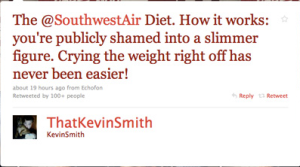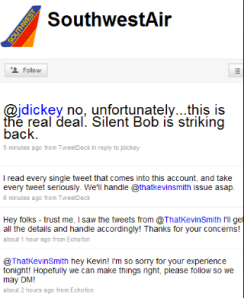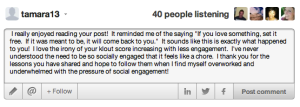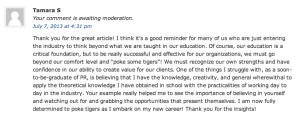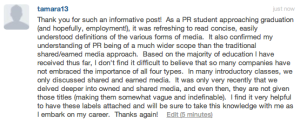- Photo Credit: swamedia.com
vs.
I really enjoyed the case study that described Kevin Smith‘s experience with Southwest Airlines. Having worked in the travel industry for many years and dealing with airlines on a daily basis, considering a situation like this from a PR perspective was an interesting change.
As a travel consultant, I was very familiar with the “passengers of size” policies as they began to be implemented by the airlines. As the front line contact between the passenger and the airline, responsibility was left to the agent to make the determination of whether to suggest they purchase a second seat to account for their size. Talk about an awkward conversation! Nobody goes to the travel agent to hear: “Hi! Thank you for coming in today. Thank you for offering me your business and trusting me to make your travel arrangements. Oh, and by the way…You’re fat. You need to pay for two seats”. Nope…nobody goes to hear that. So no travel agent ever said those words. Which, admittedly, was maybe not the correct action. Perhaps if people were aware of the policy in advance of travel, these situations would not have become so heated with the airlines directly? Or maybe it would have made no difference at all, and would have only served to damage relationships with travel agents as well as the airlines?
Either way, having a bit of insider knowledge about the sensitivity of this policy made the Kevin Smith case that much more interesting to me. I can see the argument from both sides. I completely agree that Mr. Smith was not treated fairly by Southwest Airlines. Considering they were aware that he usually purchased two seats on this route, he should not have been given the option to fly in a single seat and most certainly should not have been allowed to board and be seated comfortably only to be embarrassingly removed in front of a full plane of passengers. To add insult to injury, he was then directed to a later flight…in which he was seated in a single seat!!! #fail #southwestairlines
On the other hand, I have also had the experience of flying next to a passenger of size and, truth be told, I was not happy about being squished like a sardine into 1/2 of my seat because my neighbour could not comfortably fit into hers. I paid my money for a full seat (such as that is on today’s airlines) and why should I lose out on any precious inches and be forced to fly in horrible discomfort for the length of my journey? #insensitive?maybebutwhyshouldisuffer?
It’s a difficult call and one I’m not sure there is an easy answer to. Certainly, the airlines have not been able to come up with any real answer for it yet. From a PR perspective, I think Southwest made an effort to be proactive, take Mr. Smith offline, and deal with the issue in the best way they knew how.
Unfortunately for them, they were dealing with a person who had legions of followers, a loud (and relentless) virtual voice, and a great deal of celebrity. I’m not sure anything they could have done would have been sufficient. Having said that, I also believe that there is a need for an airline to have a policy like this. A need that Mr. Smith clearly believes in and understands – seeing as he regularly purchased two seats for himself on other flights. The true PR challenge is finding a way of communicating this to the public in a way that will make them cooperate instead of attack. The jury is out on whether this will ever be accomplished successfully!


